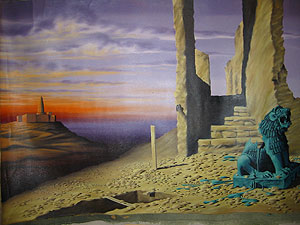|
Audio
Photos
Resources
Your Voice
|
Forbidden art from Iraq
February 6, 2003
 |
| "The Babylonian Lion" painted by Moy'ad al-Mussein, from Hala, Iraq. It is one of 40 paintings brought back by Minneapolis artist Meg Novak. (Image courtesy of the Babylon Gallery) |
Minneapolis, Minn. — The Babylon Art and Cultural Center is a nondescript storefront at 17th and Lake St. in Minneapolis. Inside there's an art gallery with old sofas, a coffeemaker in back, and a stage -- where on one wintry night, gallery founder Meg Novak and others talked about their recent trip to Iraq.
Novak traveled to Iraq with a group called Voices in the Wilderness, which is opposed to United Nations sanctions which forbid trade with Iraq. They carried medicine and other supplies into Iraq. Meg Novak delivered special contraband.
"We brought hundreds of pounds of art supplies to artists there, which they desperately needed," Novak says.
It may seem strange to describe canvas and paint as a necessities in a country without basic sanitation or food. Novak says, to artists, these are necessities.
 | |||
"The fact that those people -- who are living under those dire circumstances -- still find the ability to create is a sign of the tenacity of the human spirit," she says.
Novak then bought the paintings from the artists themselves. She hid them, rolled up in her luggage, then managed to slip them through U.S. Customs.
Now, down a flight of stairs at the Babylon Gallery, stretched and mounted once again, 40 paintings from Iraq hang on the walls.
"This picture that you see with the foot bone, and the dove and the Arabic writing, was made by an artist in southern Iraq in Basra," says Novak. "When I went to this artist's studio, he purchased electricity so I could view his paintings because they were under a blackout. And this guy has these amazing works of art everywhere."
Other paintings are representational lively street scenes, a neighborhood in Baghdad with cramped and winding streets.
There is modern interpretation of traditional calligraphy, There are surrealist paintings, including a depiction of an ancient Byzantine site, with enormous stone lions melting into the earth.
"There has been civilization in their country for over 6,000 years. They feel they are the bearers of that culture," says Novak. "That's one of the reasons art is still so important in their society. You know I met these artists in Iraq who are using tar because they don't have any paint."
 | |||
While Iraqi artists lack paint, they also lack freedom. They can't make artwork critical of Saddam Hussein or the government. A gallery like Babylon could not exist in Baghdad.
Haider Al-Amery came to Minneapolis seven years ago from southern Iraq. He now paints in a basement studio at the Babylon. Al-Amery says the paintings Novak brought from Iraq reflect the country -- restrained and lacking color.
"Iraq is like hell," Al-Amery says. "How they paint? If somebody can't eat, how can he buy brush? I think they want to do more stuff in the painting but they can't."
There are questions about what the Babylon Art Gallery can do. U.S. legal experts say Novak could be fined or even jailed for bringing the art here.
Peter Erlinder, a professor at William Mitchell Law School, says the new federal powers designed to fight terrorism are unprecedented and vague.
"It's unlikely that federal agents will raid the Babylon Gallery," Erlinder says. "The point is -- the power exists to do this, and there's no way to know absolutely how that power is going to be exercised."
Which, says Erlinder, creates a chilling effect on protest. Meg Novak is undeterred.
"As a part of the exhibit we're going to let people know it's illegal for us to have this art here," says Novak. "I think that will be a powerful reality check for people about what the sanctions really are. It's not about containing one dictator, but it's about humiliating and starving a whole people."
The exhibit of art from Iraq opens Feb. 8 at the Babylon Gallery in Minneapolis.
|
News Headlines
|
Related Subjects
|
